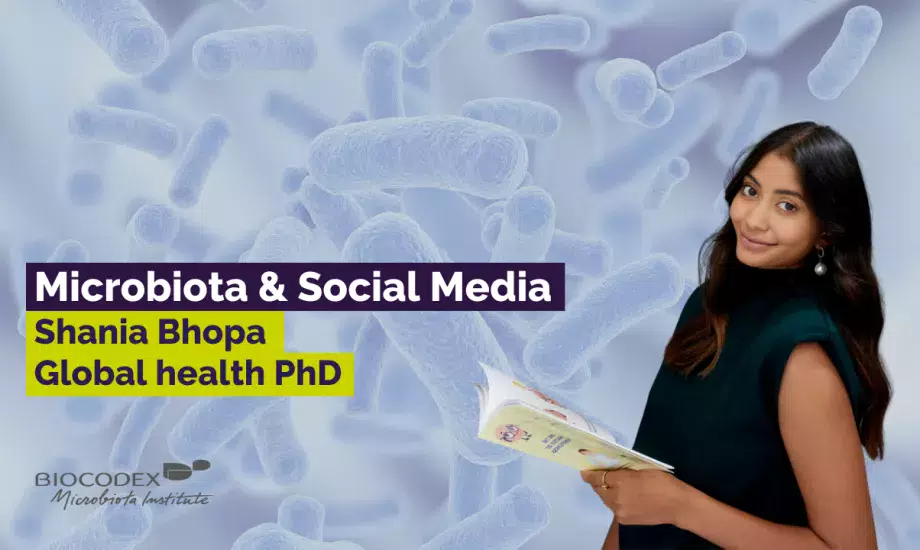Decoding gut health trends on social media
There are a lot of misinformed trends that take off on TikTok, claiming to heal your gut without providing scientific evidence. In this article, Shania Bhopa discusses how to spot misinformation and critically analyze social media gut-health content.
- Learn all about microbiota
- Microbiota and related conditions
- Act on your microbiota
- Publications
- About the Institute
Healthcare professionals section
Find here your dedicated section
Sources
This article is based on scientific information

About this article
Author
The era of mis-information is ever expanding. In health information shared on platforms like TikTok, the critical evaluation of content becomes paramount, especially concerning gut microbiota. The gut microbiota, composed of trillions of microorganisms, plays a pivotal role in digestion, metabolism, immune function, and mental health.
Here are some stats on the hashtag #guthealth:
540k videos on TikTok
5.5 million videos on Instagram
Misinformation can be particularly harmful to individuals with conditions such as Irritable Bowel Syndrome (IBS) or Inflammatory Bowel Disease (IBD), where accurate and evidence-based information is crucial for managing symptoms effectively. Evidence-based practice ensures that interventions and treatments are founded on robust scientific evidence, improving patient outcomes and optimizing healthcare delivery.
The goal is to have individuals feel confident in their ability to discern credible information from falsehoods. This not only aids in the better management of gut health conditions but also prevents the potential exacerbation of symptoms caused by following misguided advice.
The following topics have been commonly discussed on social media platforms. Let's talk about the evidence.

Drinking Aloe Vera every day will help your gut and gut microbiota
Research on aloe vera juice and its effects on digestion highlights its potential benefits. Aloe vera juice has been proven to provide a useful source of vitamins and amino acids when consumed orally. 1 However, while aloe vera's benefits for digestion are noteworthy, it's crucial to recognize this as just a fragment of the complex gut health puzzle. Our lifestyle, diet, stress levels, and other environmental factors impact gut microbiota, underscoring the importance of a holistic approach to digestive health.
Drink Beet juice to “flush 8-10lbs” of waste from your body
Research indicates that beet juice could be beneficial for the digestive system due to its rich content of bioactive compounds, antioxidants, and fibres. Betalains and phenolics in beet juice can positively modulate the gut microbiota and promote gastrointestinal health, making it a healthy choice for improving digestive function. 2
While sensational claims on platforms like TikTok, such as “drinking beet juice to eliminate 8-10lbs of waste”, lack scientific backing and veer into misinformation, the truth about beets and digestion is grounded in their nutritional composition. The presence of betalains and phenolics in beet juice has been found to influence gut microbiota and bolster gastrointestinal health positively, underscoring the value of beets in promoting digestive function. Therefore, while the extravagant claims about beet juice may not hold up, its legitimate benefits for digestion highlight the importance of integrating such nutrient-rich foods into our diets for overall gut health and well-being.

If you are not pooping after every meal... You are CONSTIPATED!
According to the American Gastroenterological Association, constipation is typically characterized by having fewer than three bowel movements in a week, not by the absence of bowel movements after each meal. 3 However, it's important to note that normal bowel movement frequency can vary greatly from person to person, ranging from several times a day to three times a week. The spread of misinformation such as the claim that not pooping after every meal equates to constipation, underscores the critical need for evidence-based health information.

Drink a lemon/ginger/honey shot on an empty stomach for your gut health
Research suggests that ginger extract can indeed have beneficial effects on gut health, particularly in ameliorating antibiotic-associated diarrhea, restoring gut microbiota, and improving intestinal barrier function. 4 However, it's crucial to highlight that most of this evidence stems from animal trials, which may not directly translate to human health outcomes. Additionally, while ginger shots are generally safe for consumption, excessive intake can lead to gastrointestinal discomfort, including heartburn, diarrhea, or an upset stomach.
There is no evidence to suggest the frequency and quantity of lemon/ginger/honey shots to be beneficial to gut microbiota.

“Drink the magic potion green juice every morning” to improve your gut microbiota
Evidence suggests that while juice can provide some nutritional benefits, its lack of fibre content may limit its effectiveness in supporting digestion. Fibre is crucial in increasing fecal mass and reducing intestinal transit times, contributing to healthier digestion processes. Since juice typically lacks fibre, it might not aid effectively in digestion compared to whole fruits or vegetables that contain soluble and insoluble fibers.
Moreover, while specific juices, such as citrus juices, might offer some health benefits, they can also directly irritate the esophageal mucosa, potentially exacerbating symptoms in individuals with irritable bowel syndrome (IBS) and thus not aiding digestion. 5
In summary, while juice may provide some nutritional benefits, its lack of fibre makes it less effective in promoting digestion than whole fruits and vegetables. The emphasis on consuming whole foods with natural fibre remains essential for digestive health and overall well-being.
What can you do to learn more about evidence-based health and critically analyze your social media posts?
Various tools like Consensus, You.com, and ScholarAI play pivotal roles in deciphering evidence on health topics. These tools not only streamline the process of accessing and interpreting scientific evidence but also empower individuals to take charge of their health by equipping them with the knowledge they need to make evidence-based choices.






















